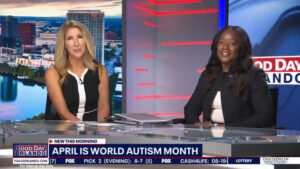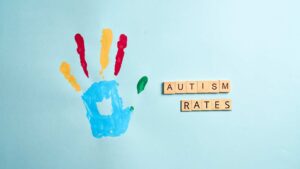Tabla de contenidos
Do people with autism struggle with self-care?
Self-care is a vital life skill that promotes independence, confidence, and overall well-being. However, when it comes to autism and self-care, developing these skills can present unique challenges. From sensibilidades sensoriales to communication barriers, self-care tasks that may seem small to others can pose challenges for those with autism.
Do people with autism struggle with self-care? This question resonates deeply with families navigating autism and self-care. The reality is that developing self-care skills for autism can require appropriate strategies, consistent support, and evidence-based approaches like ABA therapy. With the proper backing, individuals on the spectrum can learn, practice, and master these essential skills.
As we explore autism and self-care, we’ll discover how developing these skills not only promotes independence but also enhances quality of life, builds confidence, and opens doors to greater opportunities for those with autism. If you’re a parent, caregiver, or educator eager to support your loved one in building effective self-care habits, this guide by ABA Centers of Florida is here to help.
Understanding Self-Care Skills for Autism
Self-care encompasses far more than simply following daily routines or maintaining good grooming habits. It’s a vital life skill that fosters independence, confidence, safety, and overall well-being.
Los International Journal of Nursing Sciences study defines self-care by these three key attributes:
- Awareness: Recognizing personal needs and tasks to maintain well-being
- Self-Control: Regulating emotions and actions to accomplish daily tasks
- Self-Reliance: Managing personal care independently to foster autonomy
For individuals with ASD, developing these skills can present unique challenges due to the characteristics they experience, including:
- Sensory sensitivities that may make certain textures, sounds, smells, or tastes overwhelming
- Communication barriers that affect understanding instructions or expressing needs
- Executive functioning differences that impact planning and completing multi-step tasks
- Motor planning difficulties that complicate physical movements needed for self-care
- Emotional regulation challenges that can make transitions between activities difficult
Autism and Self-Care: Essential Skills That Build Independence
When developing self-care skills for autism, it helps to focus on key areas that significantly impact independence and dignity:
Personal Hygiene: When approaching autism and self-care, teaching skills like hand washing, toothbrushing, showering, and grooming creates a foundation for health and social integration. Breaking these down into manageable steps with visual supports can transform overwhelming tasks into achievable routines.
Dressing: Learning to select appropriate clothing, manage fasteners like buttons and zippers, and dress independently provides enormous confidence. Temperature-appropriate choices and sensory-friendly options are significant for autistic individuals who may have specific sensory preferences.
Toileting: From entrenamiento para usar el baño to managing personal hygiene, these sensitive yet essential skills require patience and a consistent approach. Creating comfortable routines around bathroom use helps reduce anxiety and build independence. Autism Speaks offers a toileting training guide that can be useful!

Eating/Feeding: Developing the ability to use utensils, prepare simple foods, and follow mealtime routines supports nutrition and social participation. Gradual exposure techniques can expand food acceptance for those with sensory food aversions.
Sleep Hygiene: Establishing healthy sleep patterns through bedtime routines and creating sensory-friendly sleep environments helps combat the sleep issues that commonly accompany autism.
ABA Therapy for Self-Care Skills: A Proven Approach
Applied Behavior Analysis (ABA) therapy offers a systematic framework for teaching self-care skills to individuals with autism. Unlike one-size-fits-all approaches, ABA therapy for self-care skills begins with a detailed assessment of the person’s current abilities, challenges, and preferences.
From there, skills are broken down into manageable components and taught through:
- Task analysis: Breaking complex skills into smaller, achievable steps
- Chaining: Teaching steps in sequence, either forward or backward
- Prompting and fading: Providing just enough support to succeed, then gradually reducing assistance
- Refuerzo positivo: Celebrating successes to build motivation
- Generalization training: Ensuring skills transfer to different settings and situations
Positive reinforcement is a crucial aspect of teaching various skills to individuals with autism through ABA care. This approach involves praising and rewarding positive behaviors, which encourages them to occur again by creating positive associations.
When applying positive reinforcement, it is vital to remember that each individual responds to their preferences. Therefore, finding what works best for each learner may involve some trial and error with the guidance of qualified ABA professionals.

7 Strategies for Autism and Self-Care
- Break Down Complicated Tasks: Individuals with autism may struggle with completing multi-step tasks or following complex instructions. To make learning self-help and personal care more manageable, break tasks down into smaller sequences with straightforward steps. For example, instead of teaching a child with autism how to brush their teeth all at once, break the entire task into small, achievable steps: wetting the toothbrush, adding toothpaste, brushing each section of teeth, and rinsing the mouth.
- Usar Ayudas Visuales: Pictures, charts, or written instructions are tools that can help individuals with autism understand expectations. Many people with ASD work best with visual cues and support. Consider creating a visual schedule that breaks up a complex daily routine into smaller tasks, such as a “Morning Checklist,” “Lunch Checklist,” or “Bedtime Checklist.”
- Establish a Schedule or Routine: Establishing a clear schedule or routine supports autism and self-care by promoting independence. Consistency across environments and caregivers reinforces learning and reduces anxiety about expectations. Set specific times for activities like showering, eating, or bedtime routines. Maintain this schedule as consistently as possible, even during weekends or vacations, to reinforce habits.
- Encourage Self-Expression: Allowing individuals with autism to express themselves in their way fosters creativity and builds confidence in their communication skills. Encouraging self-expression may involve incorporating activities like art or music into daily routines and providing opportunities for choice and preference.
- Seek Support from Professionals: If you’re struggling to find effective strategies for teaching self-care skills, seek support from professionals such as Board Certified Behavior Analysts (BCBAs), occupational therapists, or education specialists. These professionals can provide customized interventions and guidance to help your loved one develop essential self-help skills.
- Use Positive Reinforcement Consistently: Positive reinforcement encourages desired behaviors by creating positive associations. Celebrate small victories and progress, remembering that each step toward independent self-care is significant.
- Practice Patience and Flexibility: Teaching self-care skills for autism requires time and patience. It’s essential to remain flexible and adaptive during the teaching process. Each person learns at their own pace and may need different approaches. Remember that progress may be incremental, and what matters most is the journey toward greater independence.
Supporting Autism and Self-Care with ABA Centers of Florida
Self-care is more than a set of independent tasks; it’s a gateway to confidence, freedom, and a higher quality of life for individuals with autism. Through personalized strategies that address sensory sensitivities, communication barriers, emotional regulation, and independence, ABA therapy can help individuals with autism successfully integrate self-care into daily routines.
When therapists, educators, and parents unite to provide consistent support, individuals with autism not only master essential self-care skills but also thrive in their personal and social environments.
If you’re ready to help your child or teenager with autism learn the self-care skills they need for greater independence, consider exploring ABA therapy at ABA Centers of Florida. With expert ABA professionals, you can expect an individualized therapy plan that focuses on your loved one’s specific strengths and challenges.
Póngase en contacto con ABA Centers of Florida hoy al (772) 773-1975 o a través de nuestro sitio web. to learn how we can help your child develop the self-care skills they need to thrive. Let’s work together to empower your loved one to lead a life filled with dignity, autonomy, and achievement!








